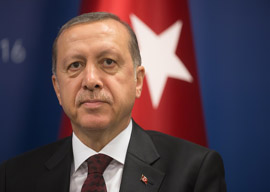
July 22, 2016

Turkish President Recep Tayyip Erdogan
Source: Bigstock
So while the conspiracy theory that Erdogan himself staged the failed coup to strengthen his position is improbable, attracting only those who will respond to any and every conspiracy theory, it is reasonable to believe that the government knew that a coup attempt was in the offing and did nothing to prevent it, and may indeed have even employed agents provocateurs to nudge it along, and had its reprisals and revenge well planned in advance. What may have surprised the government is that for a few hours the coup apparently came close to success, being thwarted ultimately by Erdogan’s decision to use Facetime and social media to urge or command his followers to throng the streets and defy the military and rebellious police. This is ironic, given that for years now, Erdogan has been clamping down on social media, blocking internet sites and monitoring any expression of dissidence.
Turkey will be even more deeply divided now. One of Erdogan’s former ministers admitted this recently when he said that half the country loves Erdogan and his party, and the other half “hates our guts.” Nothing in Erdogan’s character and history leads one to hope that he will recognize the danger to Turkey of such a deep and wide division and seek reconciliation. On the contrary, repression of the opposition”and of the Kurdish minority”will intensify. The last vestiges of a free press will disappear. The judiciary will lose such independence of the government as it has had. Social media will be monitored more intensely and people “guilty” of improper opinions arrested. Behind the facade of popular democracy, Turkey will be transformed into a one-party state. Kemalist secularism will be suppressed. Islamism will reign supreme.
So how does the West respond? There’s no immediate good answer. As in so many difficult situations, the response will be “wait and see,” which is to say, in effect, “do nothing, for fear that any action will make things worse.” We can”t legally interfere in the internal affairs of a sovereign state. In any case, foreign governments more often than not quite reasonably prefer to support stability, for fear that instability may make things worse. So, if an even more authoritarian Erdogan tightens his control of his country, becoming more repressive and more Islamist, the USA and the EU will grin and bear it. For the EU there is the fear that further upheaval in Turkey will mean more refugees flocking into the Balkans and heading north. For all of us, and the USA in particular, there is uneasy awareness of Turkey’s role in NATO and of the danger of giving President Putin any excuse for deeper involvement in the Middle East. It’s a bleak outlook for all of us”even bleaker, of course, for the secular-minded Turks who are our natural friends. The USA might remove its hydrogen bombs from Turkey; they”re not things to be left lying about in such a dangerous part of the world.
These are bad times in the Middle East, and the likelihood is that they are going to get worse. The number of people fleeing the region in search of a better life elsewhere will continue to rise, and you can”t blame anyone who sees the only hope for his children in emigration. “Let freedom reign,” cried President George W. Bush, but freedom in our ally Turkey is being crushed, and we are at a loss for a response. I suppose if Mr. Trump reaches the White House, he might propose building a wall around Turkey (and getting the Turks to pay for it, of course) or indeed around the whole region; but I don”t think it’s on, and anyway he has his Mexican wall to build first.